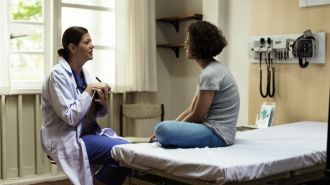- Our studies
- Our research
- Publications and resources
- Data access and training
- About
- News
- Events
- Get in touch
- Join our mailing list
Welcome to our news and blogs section. Here you’ll find the latest developments and insights from across our longitudinal studies.

Growing Up in Digital Europe (GUIDE) is the UK pilot of a major European initiative to create internationally harmonised data for research on child development and wellbeing.

Growing Up in the 2020s is the country’s first comprehensive long-term study tracking adolescents’ development and educational outcomes following the Covid-19 pandemic.

Adolescents from deprived neighbourhoods with psychological difficulties are less likely to attend hospital for mental health-related issues than their advantaged peers with similar problems.

Data from the 1970 British Cohort Study (BCS70) Age 51 Sweep are now available to download from the UK Data Service.

For the first time, large-scale DNA sequence data on three UK birth cohort studies has been released, creating a unique resource to explore the relationship between genetic and environmental factors in child health and development.

Young people from more deprived neighbourhoods have to wait up to 15 minutes longer for accident and emergency (A&E) treatment than their more advantaged peers with similar healthcare needs, according to new findings from Next Steps.

Children who express positive thoughts and feelings in their creative writing are less likely to show symptoms of depression at the age of 23, according to research led by Chapman University in California.

New research shows children who struggle with their mental health are more likely to later be excluded from school and to truant. And exclusion and truancy can increase their mental health difficulties.

Body dissatisfaction at age 11 is linked to increased risk of depression by age 14, according to new research from the Millennium Cohort Study.

The trauma associated with care experience casts a long shadow on mothers’ mental health and that of their children, finds new UCL research released today (7 February 2024).

Data from Wave 2 of the COVID Social Mobility and Opportunities (COSMO) study is now available to researchers interested in exploring how COVID-19 and the cost-of-living crisis has affected the lives of 17-18-year-olds across England.

Nearly two fifths of 17-18 year olds from the most disadvantaged areas have struggled to receive the mental health support they need in the past year.
Ryan Bradshaw
Senior Communications Officer
Phone: 020 7612 6516
Email: r.bradshaw@ucl.ac.uk